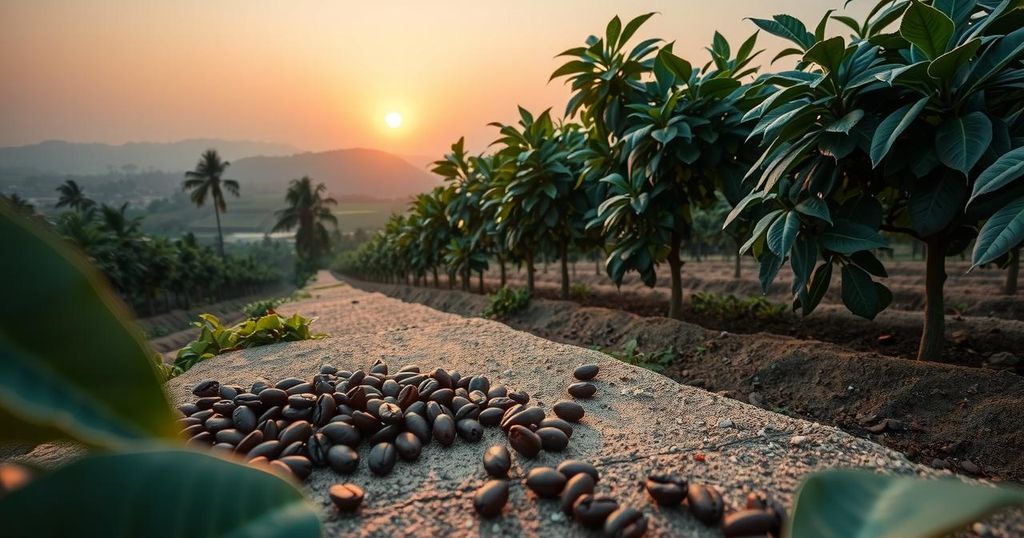Climate Change Challenges Facing Brazil’s Coffee Industry in 2024

Brazil’s coffee industry faces severe climate challenges, with production declining to 54.79 million 60kg bags in 2024 due to droughts and extreme temperatures. The Expocacer cooperative is addressing these issues through sustainable solutions, including smart irrigation and regenerative practices, coupled with support programs like Educampo. Producers like Désio Rodrigo benefit greatly from this technical assistance.
Climate change presents a significant challenge to Brazil’s coffee industry, with a reported production estimate of 54.79 million 60kg bags for 2024, reflecting a slight decline of 0.5% from the previous year. This drop is attributed to adverse climatic conditions, including prolonged droughts and extreme temperatures affecting various coffee-growing regions. In the Cerrado Mineiro area, producers encountered intense droughts, high temperatures nearing 40°C, and frosts, all detrimental to the harvest.
Fernando Couto, an agricultural engineer and expert at the Cerrado Coffee Growers Cooperative (Expocacer), noted that these climate dynamics resulted in a water deficit of over 400mm in certain areas, leading to considerable productivity losses. “High temperatures and frosts caused direct damage, such as the burning of productive branches, and indirect damage affecting the plants’ productivity potential,” he stated.
In response to these challenges, Expocacer is actively working on innovative and sustainable solutions aimed at preserving coffee farming sustainability. Couto elaborated on their strategies, emphasizing the adoption of smart irrigation systems that include soil moisture sensors and weather stations, which optimize water usage and enhance crop yields.
Additionally, Expocacer promotes regenerative agricultural practices, encouraging the use of organic fertilizers and effective soil management techniques to bolster plant resilience. Furthermore, they engage in greenhouse gas mitigation through initiatives aligned with the Brazilian GHG Protocol, becoming the first Brazilian coffee cooperative to attain such recognition, facilitating their capacity to monitor emissions and share results transparently with partners.
Expocacer also provides vital technical support, technology access, and training through initiatives such as the Educampo Project, developed with Sebrae Minas. Couto stated, “The program offers specialized consultants to assist producers with property management, providing personalized diagnostics, crop monitoring, and the creation of annual production plans.”
Désio Rodrigo, proprietor of Lidon Cachoeira Alta farm, attests to the positive effects of the Educampo Project by emphasizing sustainable soil management and strategic planning aimed at weather challenges. He asserted, “This program enabled us to identify cost-saving opportunities, reduce pesticide use, and improve production efficiency.”
Rodrigo further recognized the critical role that technical support played in modernizing his operations. He remarked, “The consultants provide comprehensive perspectives, ranging from financial management to personalized agronomic solutions, allowing us to embrace cutting-edge technologies and understand how decisions affect profitability. We are now better equipped to confront climate challenges with confidence and a clear plan. “,
In summary, climate change poses a severe threat to the coffee industry in Brazil, significantly affecting production due to extreme weather conditions such as droughts and high temperatures. The Expocacer cooperative is proactively addressing these challenges through sustainable practices, technological advancements, and support programs like Educampo, which equip coffee producers with the tools necessary for effective management and resilience against climate impacts. As demonstrated by successful implementers like Désio Rodrigo, technical guidance and innovation are pivotal in adapting to such environmental challenges.
Original Source: www.teaandcoffee.net






